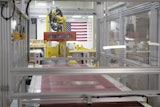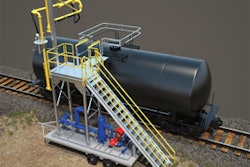This article originally ran in the April 2012 issue of Food Manufacturing.
At least in terms of total volume processed, when it comes to the automation of meat processing plants, the "tipping point" for plant automation has either been reached or is very close. Having completed more than 2,500 combined installations in partnership with world-leading packaging equipment companies, Weber sees this industry from a unique vantage point.
Certainly the industry has exceeded the 15 to 17 percent adoption levels for slicing and packaging system automation levels at which you’d say the innovators and early adapters are on board. At this point in the process adoption cycle, you'd expect that plant automation, for both economic and food safety reasons, would be moving downstream to the early majority among mid-sized processors.
The quest for end-to-end processing solutions is driven by our industry’s increasing needs for cost containment, as well as the threats and consequences of foodborne illness.
It was only a few years ago when many of our customers had a slicing rooms that measured just 40-feet long and had as many as eight people loading and running a typical slicing line. Workers were peeling and loading the 3-to-5-foot product logs. Others were on site to assure quality, adjust portions that did not meet specs and assist the package loading process.
Today, many of our customers' floor plans provide 140-foot clean-slicing rooms with minimal personnel. First motivated by economic factors, many high-level processors encouraged Weber to design and develop the ability to process 10-foot logs that weigh up to 100 lbs or more, which created ergonomic issues for workers. The end-to-end systems we engineered to peel, load and slice these huge logs have significantly cut labor costs while simultaneously improving food safety.
I also see interest in Weber's food robotics moving downstream to processors of all sizes. They understand the story. Robotics are capable of amazing feats of dexterity, picking and turning portions for automatic loading into packaging — again, sans human contact. They don’t earn benefits and never take a sick day. In the end, plant automation, from beginning to end, is a wise investment. Its time has come.
Weber manufactures a complete line of high-tech slicing machinery, as well as a wide variety of skinners, derinders, robotics and ice machines. Founded in 1981, Weber operates three manufacturing facilities in Germany, as well as the North American Technology Center and demonstration facility in Kansas City, Mo. For more information contact the Weber, Inc sales office at 1-800-505-9591 or by email at [email protected].























